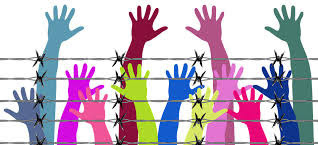“Our age which has often been so cruel, can now pride itself on having witnessed the birth of a universal human rights movement. In all walks of life brave individuals are standing up for their brothers who have been reduced to silence by oppression or poverty. Their struggle has transcended all frontiers, and their weapon is knowledge… Defending human rights today means above all bringing the most secret crimes to light. It means trying to find out and daring to speak out with complete objectivity, something which requires courage and occasionally, even heroism… The United Nations is cognizant that, for human rights to be more fully recognized and respected, the awareness and support of all are required.”
— Javier Perez de Cuellar, then Secretary General of the United Nations
 3 Aug 2018 – As we reflect on how NGOs may work together to meet the challenges which face the world society, we turn to human rights as the foundation on which we can build. It is useful to look at past efforts to build such foundations and the difficulties in getting government representatives to agree. It is easy to grow cynical at governmental double standards, politically selective hypocrisy and tactical alliances. Yet success in the human rights field depends on a continuing commitment to outwit those who have a vested interest in keeping the UN weak and unable to act effectively. It is important to note the landmarks of progress. These are some of the victories where intense effort and creative cooperation among representatives of non-governmental organizations (NGOs), UN Secretariat, independent experts, and a few representatives of progressive governments created awareness, worked to get resolutions adopted, and built structures for follow up. Each case would merit a fuller analysis and character sketches of some of the players, but that would be a book rather than an article. 3 Aug 2018 – As we reflect on how NGOs may work together to meet the challenges which face the world society, we turn to human rights as the foundation on which we can build. It is useful to look at past efforts to build such foundations and the difficulties in getting government representatives to agree. It is easy to grow cynical at governmental double standards, politically selective hypocrisy and tactical alliances. Yet success in the human rights field depends on a continuing commitment to outwit those who have a vested interest in keeping the UN weak and unable to act effectively. It is important to note the landmarks of progress. These are some of the victories where intense effort and creative cooperation among representatives of non-governmental organizations (NGOs), UN Secretariat, independent experts, and a few representatives of progressive governments created awareness, worked to get resolutions adopted, and built structures for follow up. Each case would merit a fuller analysis and character sketches of some of the players, but that would be a book rather than an article.

I list 10 victories which seem to me to be real advances. Others would no doubt make different lists, but as an NGO representative to the UN in Geneva, I had participated in each of these advances and knew the key players. Governments, that alone have the ability to vote UN resolutions in the end, happily take credit for advances. Yet in these cases, progress was made by ideas coming from NGO representatives, helped by UN Secretariat civil servants who must keep a “low profile”, and the representatives of some governments where an issue touched them personally — and did not go against their government’s policy.
1. Awareness of the rights and conditions of indigenous and tribal populations. When this issue was first raised in the early 1980s “indigenous” were considered to be only the Indians of North America who had come in force to present their case in Geneva. Some governments finally went along thinking that such analysis would be a subtle criticism of the USA without costing them anything. However, the International Labour Organization Convention N° 109 on indigenous peoples, the only UN treaty on the matter, speaks of “indigenous and tribal”. Thus, it was possible to raise issues of tribal groups in south-east Asia such as the Chakma of Bangladesh, who are not “indigenous” having migrated from south China over the last 1000 years but have a tribal society. Much of the advances in the field are due to the skills and dedication of Ms Erica Daes who for many years chaired the Working Group on Indigenous Populations. Now, the indigenous and tribal issues cover a wide number of countries and have moved to center stage.
2. Torture. When the use of torture was first raised in 1973, torture was thought to be a rare practice limited to a small number of countries. It turns out that it is, in fact, widely used by a large number of countries. Getting torture to be a recognized issue and having the Commission on Human Rights create the post of Special Rapporteur on Torture owes much to Sean MacBride (1904-1988) at the time chairman of the Amnesty International Executive Committee (1961-1974) and Nobel Peace Prise laureate (1974). MacBride had been the Foreign Minister of Ireland (1948-1951) and knew how governments work. He had also been a long-time member of the Irish Republican Army (1917-1936) and knew well how police as well as insurgencies work having spent time in prison. MacBride called torture an ‘epidemic’ perpetrated by regimes ‘to control dissent and maintain power.’ The well-organized campaign against torture brought together numerous NGOs to pressure governments in the UN General Assembly to take action.
3. Death Penalty. The efforts for the abolition of the death penalty also owe much to Amnesty International and its long-time Secretary-General the late Martin Ennals. His role, often in the background but always on key issues, is an example of how NGO impact can be made.
4. Conscientious objection to military service. Conscientious objection as a human rights was a long but successful fight on the part of a small number of NGOs such as the Quakers, the Fellowship of Reconciliation and the International Peace Bureau. It was led by the representatives of Ireland, Canada and Austria — all of which have armies but whose representatives went “that extra mile” to overcome opposition and get the resolution passed.
5. Child Soldiers. The attention now given to the human rights violations from the existence of child soldiers — both the fact that children are taken as soldiers and the human rights violations that they are forced to commit was brought to the attention of the Commission on Human Rights by the Quakers and the NGO Defense for Children. This led to the creation of a Special Representative on Children in Conflict as well as attention at the UN Security Council and the International Criminal Court.
6. The Right to Housing. The right to housing and especially the destruction of houses in the process of slum clearing, often done without re-housing, owes its place on the human rights agenda to a small number of NGOs but who had dramatic examples of abuses. There is now an active Special Rapporteur on the Right to Housing.
7. Freedom of Religion and Belief. It was a 20-year effort to get the adoption in 1981 of the Declaration on the Elimination of All Forms of Intolerance Based on Religion or Belief. It was an effort kept alive by a small number of States and NGOs. It is not sure that as far-reaching and complete a Declaration could be drafted today. The Declaration serves as a guideline for the right to belief in many of the current religious-based tensions.
8. The Rights of Women. It is always strange how difficult it is to get proper attention to the rights and condition of women since they are half and probably more of humanity. Nevertheless, it has been a long effort largely carried by NGOs. It is a multifaceted effort and was helped by a series of UN-sponsored conferences on women. Geneva-based NGOs such as the Women’s International League for Peace and Freedom have played key roles. The concept that women exist and thus have rights has brought together NGOs who are often divided on other issues.
9. Systematic rape. The awareness of systematic rape as a crime against humanity has grown as part of the broader effort on the equality of women mentioned in point 8. Many of the NGOs concerned with equality of women have been concerned with domestic violence as well. Thus, they reacted strongly to reports of systematic rape during the conflicts in former Yugoslavia. This issue has also been raised concerning the conflict in Darfur, Sudan, and in the eastern provinces of the Democratic Republic of Congo.
10. Human Rights Defenders. I leave for last our auto-defense: the efforts to protect human rights defenders on the front lines. Raising human rights issues in a good number of countries can get you into trouble. Even writing to Amnesty International is not a danger-free practice in some places. The killing in Moscow of Anna Politkovskaia, in 2006, a journalist critical of the conflict in Chechena, is there as a symbol of all those on the front lines of human rights efforts. Thanks to NGO efforts, the UN has created a Special Rapporteur on Human Rights Defenders — a constant reminder to governments and in some cases non-governmental militias that they are being watched
All these victories are fragile, and there are governments who would want them reversed or forgotten. We can welcome these advances, remember those whose drive, skills and determination helped bring forward these issues which many would have left in the dark. We need to prepare for the next battles which are not far away. |
 René Wadlow is a member of the Fellowship of Reconciliation’s Task Force on the Middle East, president and U.N. representative (Geneva) of the Association of World Citizens, and editor of Transnational Perspectives. He is a member of the TRANSCEND Network for Peace Development Environment.
René Wadlow is a member of the Fellowship of Reconciliation’s Task Force on the Middle East, president and U.N. representative (Geneva) of the Association of World Citizens, and editor of Transnational Perspectives. He is a member of the TRANSCEND Network for Peace Development Environment.

